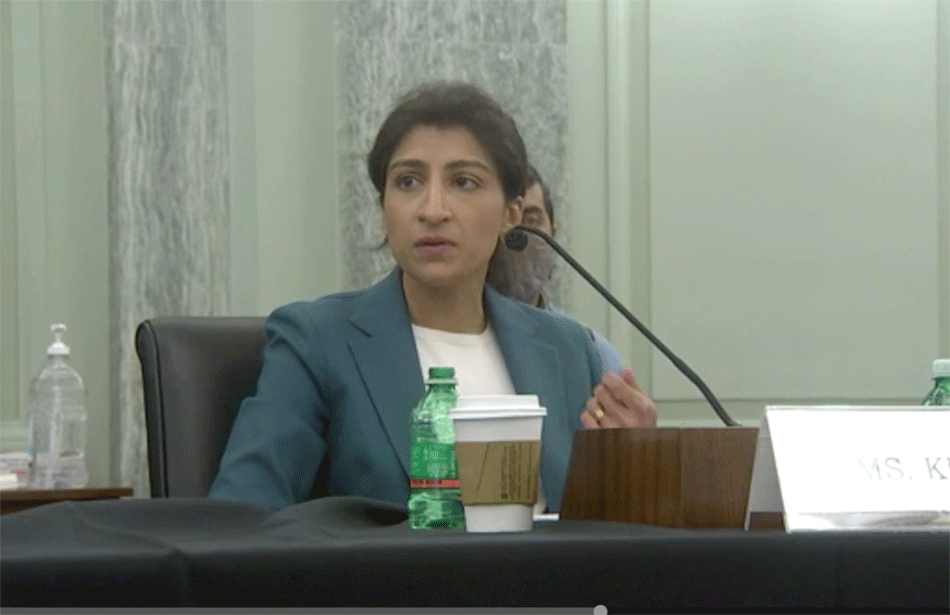Khan FTC Stakes Out New Regulatory Process Ground
Tech companies said agency needs to be more transparent

The smarter way to stay on top of the multichannel video marketplace. Sign up below.
You are now subscribed
Your newsletter sign-up was successful
It has not taken long for new Federal Trade Commission chair Lina Khan to signal big FTC process changes are coming, including by starting to hold public meetings--as the FCC has always done--and circulating some proposals for public perusal, though not enough and with insufficient enough lead time for the tech companies that will almost certainly be on the business end of the commissions effort to ramp up its rulemaking authority.
Unlike the FCC, the FTC has primarily been an enforcement authority, releasing press releases or holding the occasional press conference to announce it is filing suit or has secured a settlement over false, deceptive or anticompetitive conduct. But FTC chairs from both parties have signaled the agency should beef up its rulemaking--including to deal with the biggest of Big Tech--and Khan seems clearly to be on the same page.
Also Read: FTC Rescinds Competition Policy Guidance
In advance of the FTC's Wednesday (July 21) public meeting, at which it is expected to rescind more policies that have governed its competition reviews, the Consumer Technology Association (CTA) weighed in on last month's vote to rescind a competition policy statement without replacing it with new guidance, which CTA said "creates significant uncertainty for business throughout the marketplace, ultimately raising compliance costs and deterring innovation.”
"CTA supports the Commission’s move to schedule public Commission meetings for rulemaking and policy matters and to circulate an advance agenda so that the public can see what the agency is considering," CTA told the agency. But there was a "but." CTA said it would be better to provide more notice and transparency on any policy or rulemaking under consideration, particularly one on competition policy.
It said more time for input could only help the commission make its decisions, suggesting at least 30 days for comment before the FTC acts. "CTA urges the Commission to provide much greater and more specific advance notice of rulemaking and policy proposals to be considered at the FTC’s public meetings."
As a negative example, CTA pointed to the FTC's July 1 vote to rescind the 2015 “Statement of Enforcement Principles Regarding ‘Unfair Methods of Competition’ Under Section 5 of the FTC Act."
CTA pointed out that the FTC announced that the proposal was being voted on only a week before it happened, "giving very little time for public input – and certainly far less time than the Commission gives for comment even on routine matters," it said. CTA also said that the FTC had not provided the public with enough detail on the proposal, an "extremely significant" change for which the public had little time for input.
Also Read: FTC Competition Guidance Move Draws Crowd
In a 3-2 vote along party lines, the FTC signaled it was rethinking its enforcement principles regarding its Sec. 5 authority to prevent unfair methods of competition, saying that under the current FTC guidance, the commission "has doubled down on the Commission's longstanding failure to investigate and pursue 'unfair methods of competition.'"
In the 2015 statement, the FTC said that, using a "consumer welfare" standard, it would only challenge actions that cause or are likely to cause harm to competition, "taking into account any associated cognizable efficiencies and business justifications."
The 2015 statement also said the commission would be less likely to individually challenge an act or practice as unfair competition if it concluded that "enforcement of the Sherman or Clayton Act is sufficient to address the competitive harm arising from the act or practice."
Kahn and the Democratic majority have signaled that is not a sufficiently active voice for the the FTC to use when it comes to competition policy, particularly in a world where they argue Big Tech bought its way to monopoly under the Sec. 5 enforcement radar.
The smarter way to stay on top of the multichannel video marketplace. Sign up below.
Contributing editor John Eggerton has been an editor and/or writer on media regulation, legislation and policy for over four decades, including covering the FCC, FTC, Congress, the major media trade associations, and the federal courts. In addition to Multichannel News and Broadcasting + Cable, his work has appeared in Radio World, TV Technology, TV Fax, This Week in Consumer Electronics, Variety and the Encyclopedia Britannica.

